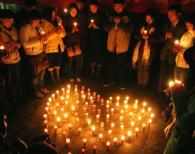Rhode Island is now the 13th state to include gender-identity and expression in its hate crime laws.
The Transgender Hate Crimes Monitoring Bill (S2488) was introduced to the Rhode Island General Assembly on February 16. It passed the Rhode Island House on May 24, and Governor Lincoln D Chafee signed the bill on May 30.
The Transgender Hate Crimes Monitoring Bill assists in the research and safety of Rhode Island’s transgender population. In addition, because the bill addresses all hate crimes committed from gender identity or expression bias, victims of all gender identities are protected under this statute.
Specifically, the bill adds gender identity and expression to Rhode Island’s hate crimes reporting statute, which already specified race, religion, gender, disability and sexual orientation as motivating prejudices.
This now requires Rhode Island State Police to not only report hate crimes based on gender identity and expression, but to also undergo mandatory training regarding the handling of gender identity and expression related hate crimes.
transgender

Today is the 11th annual International Transgender Day of Remembrance, a day when we remember those killed because of anti-transgender hate. The event was created in 1999 to memorialize Rita Hester, a trans woman who was killed in San Francisco. Her case remains unsolved, as do so many murders of transgender people, who face extremely high rates of discrimination and violence. TDOR has a partial list of those we remember today. In the past year, we have seen the convictions of the killers of Lateisha Green and Angie Zapata, and the passage of the Matthew Shepard and James Byrd Act, the first major piece of federal legislation extending legal protections to LGBT people; yet there is much more work to do.

A Family Member of a Transgender Victim Speaks Out
Q & A with Imelda Guerrero
Editor’s Note: In 2002, Gwen Araujo, a 17-year-old transgender teenager, was brutally beaten to death by a group of young men from Newark, California, when they discovered her transgender identity. Not long after her disappearance, her body was found in a shallow grave in the foothills of the Sierra Nevada mountains. As her family grieved the violent death of their loved one, the case captured the attention of the national media. NIOT Producer Kelly Whalen, who told Gwen’s story in “Not In Our Town Northern California: When Hate Happens Here,” spoke with one of Gwen’s aunts, Imelda Guerrero, about the support the family needed and received through the tragic experience.

A Student Reflects On a Peer's Murder and His Community's Response
By Jeff Bryant

On Friday, a jury found Dwight DeLee guilty of manslaughter in the first degree as a hate crime for killing Lateisha Green. This is the first hate crime conviction for the killing of a transgender person in New York state, and only the second such conviction in the United States. Though the trial is concluded and Lateisha’s family feels justice has been served, transgender people around the world face extremely high rates of discrimination and violence. Posts at Transgriot, Questioning Transphobia, and Feministe address the issues of pronoun usage, the lack of protection for trans people under New York hate crime laws, and the ongoing threat of violence to transgender people.
Since 2008, the murder of a trans person is reported every third day, and many of these murders go uninvestigated and unsolved (source: Transgender Europe via Questioning Transphobia).
What You Can Do:
